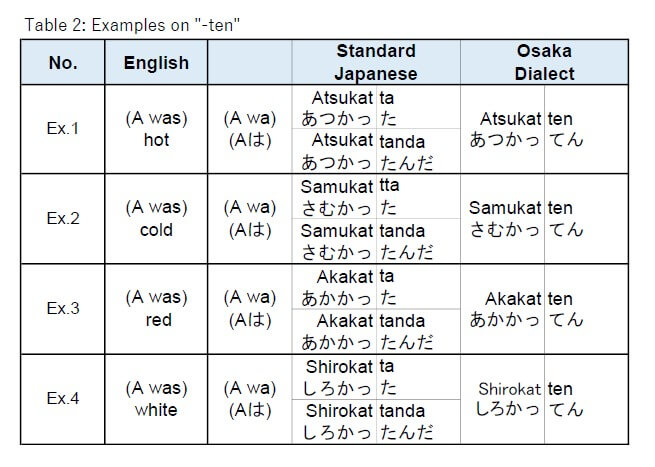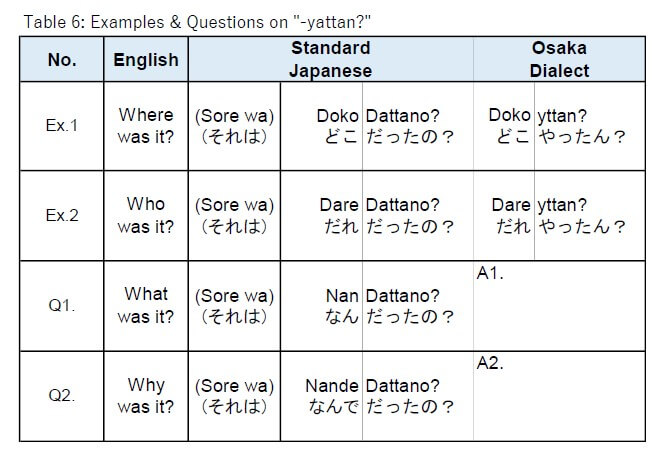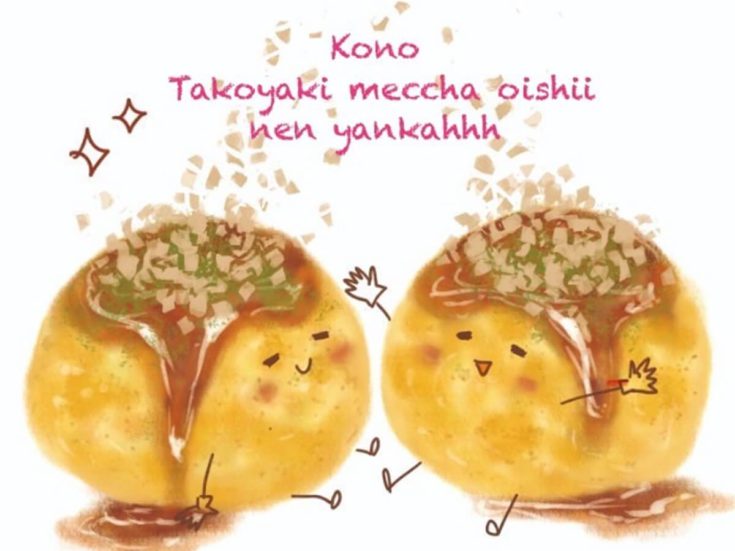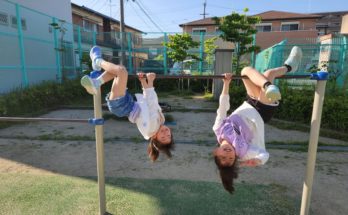Hello, everyone!
In the previous article, I wrote about “-nen (ねん)” and “-yanen (やねん),” which correspond to the Osaka dialect’s well-known sentence endings in standard Japanese for the present tense, such as “-yo (よ)” and “-nda (んだ).” This time, I’d like to talk about “-ten -(てん),” which is used for the past tense.

1. Review of “-nen”
First, let’s review “-nen” and “-yanen.” After reading the examples, let’s try solving some quizzes in Table1.

The answers are…
A1. Akai nen (あかいねん)
A2. Shiroi nen (しろいねん)
Did you remember?

2. Past Tense in Osaka Dialect “-ten”
Now, let’s move on to the past tense. In the past tense, “atsuiyo (あついよ)” and “atsuinda (あついんだ)” become “atsukatta (あつかった),” right? In the Osaka dialect, we say “atsukatten (あつかってん)” for that. Similarly, “samukatta (さむかった),” “akakatta (あかかった),” and “shirokatta (しろかった)” undergo similar changes as seen in Table 2.

Now then, let’s practice! Please fill in the blanks in Table 3.

The answers are…
A1. Kowakatten (こわかってん)
A2. Sugokattenn (すごかってん)
A3. Kawaikatten (かわいかってん)
*You can also add “-na” at the end according to your preference. For example, “kowakatten na,” “sugokatten na,” “kawaikatten na.”

3. Review of “-yanen”
So, do you remember how the standard Japanese endings “-nano” and “-nanda” are expressed in the Osaka dialect? Let’s review that and answer some questions in Table 4.

The answers are…
A1. Shiawase yanen (しあわせやねん)
A2.Tomodachi yanen (ともだちやねん)

4. Past Tense in the Osaka Dialect “-yatten”
Now, let’s delve into the transformation of standard Japanese past tense expressions, such as “-dattano (だったの )” or “-dattanda (だったんだ),” when expressed in the Osaka dialect. In the Osaka dialect, the corresponding past tense forms involve the distinctive ending “やってん” instead. For example, if we consider the standard form “Sukidattano/Sukidattanda (すきだったの/すきだったんだ),” in Osaka dialect, it would become “Sukiyatten (すきやってん).” This pattern holds true for other expressions like “Kiraidatta/Kiraidattanda (きらいだった/きらいだったんだ).” in the Osaka dialect. This shift reflects the unique nuances of the Osaka dialect in expressing past events.
Now, let’s answer the questions in Table 5.

The answers are…
A1. Tokui yatten (とくいやってん)
A2. Nigaate yatten (にがてやってん)
*You can also add “na” at the end according to your preference. For example, “Shiawaseyattenna(しあわせやってんな),” “Tomodachiyattenna (ともだちやってんな).”
5.Osaka dialect interrogative ending “-yattan?”
So, what happens to the interrogative endings in the Osaka dialect? This is a little different from the above, but let’s try to solve the quizzes along with the examples.

The answers are…
A1. Nan yattan? (なんやったん?)
A2. Nande yattan? (なんでやったん?)
*Some people might say, “-yatten? (やってん)?” instead of “-yattan? (やったん?)” The use of that expression may sound a bit rough.
Got it?

By the way, have you ever heard Osakan people saying something like, “-yanenyankahhhh (やねんやんか~)” or “-yattenyankahhhhh (やってんやんか~)”? Now that you’re familiar with “-nen (ねん)” and “-ten (てん),” what about “-yankahhhh (やんか~)”?
Those basically mean the declarative expressions “- da” (present tense) and “- datta” (past tense) introduced in textbooks as standard Japanese.
I will explain how such simple words transform and become like that using the simple sentence “This takoyaki is/was good.” Please take a look at Table 7-1 and 7-2.

Yeah, I know. What a complicated language Japanese is!!

Lastly, as I mentioned in my previous article, I volunteer to teach Japanese. One of my students mentioned, “Japanese is already challenging because the predicate comes at the end, but with Osaka-ben, adding long sentence endings at the end makes it even more confusing.
She was surprised when I explained that the fundamental meaning of “-yanenkahhhh” and “-yattenyankahhhh” are just “It’s -,” and “It was -,” respectively. When people study Japanese, they don’t necessarily need to speak exactly like native speakers. However, by familiarizing themselves with the words and expressions used by native speakers, I believe they can develop their listening skills and enjoy conversations. It applies to any language, including various regional dialects. I would be happy if these rules I shared made it easier to comprehend Osaka-ben for non-Osaka-ben native speakers.
I live in Osaka and teach Japanese as a volunteer. My dream is to live in Malta, an island country in the Mediterranean, after retirement.





As a non-Osaka ben speaker, this article is helpful and an eye-opener. In addition, pictures and tables are also helpful to understand. Thank you for the great lesson of Osaka ben.
Hi, Hidemi chan! Thank you for leaving a comment here too! I want to start brainstorming ideas for part 3!